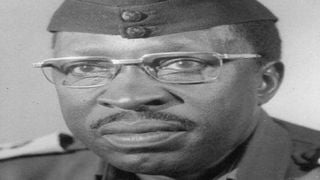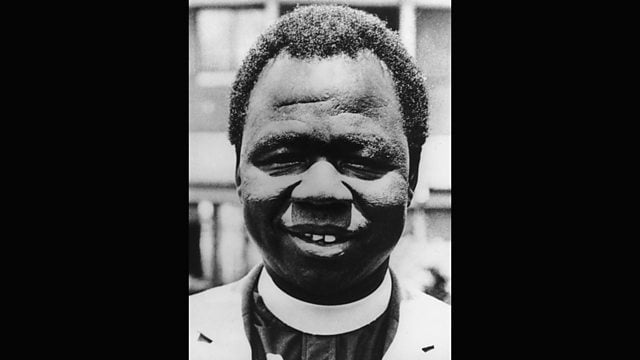
The late Lt Col Erinayo Wilson Oryema. PHOTO/COURTESY
|National
Prime
Remembering ex-IGP Wilson Oryema
What you need to know:
- February 16, 1977 was a dark day for the family of ex-Inspector General of Police Erinayo Wilson Oryema.
- When their father was arrested on the afternoon of that day, together with Archbishop Janani Luwum and Charles Oboth-Ofumbi, the minister of Internal Affairs, little did they know that they would never see him again. Gillian Nantume spoke to his relatives about the events of those dark days.
It’s the dry season, and Tangi Farm, in Purongo Sub-county, Nwoya District, seems deserted. The 20,000-acre farm, that the late Lt Col Erinayo Wilson Oryema, the former minister of Lands, Housing and Physical Planning, left to his children is embroiled in a bitter land wrangle.
Gen Charles Otema Awany, the commander of the Uganda People’s Defence Forces (UPDF) Reserve Force, and his brother are accused of grabbing more than 3,500 acres of the farm.
The family can only access 650 acres, and gaining entrance to that portion is no mean feat, even for family members. One must explain to the policeman guarding the gate exactly what their mission is.
At the time of his death on February 16, 1977, Lt Col Oryema was the longest-serving minister in Amin’s government. He joined Uganda Police Force in 1939 and rose through the ranks to become Uganda’s first African Inspector General of Police (IGP) in 1964. In 1971, Amin appointed him minister of Minerals and Water Resources.
Oryema’s home is now in ruins. On February 17, 1977, while five of his relatives were burying Oryema, the soldiers who had brought his body were busy looting everything in the house and on the farm. The villagers stole whatever was left, including cattle. In the 1980s, they returned, looting the iron sheets and bricks off the house.
A few metres away from the house, Oryema and his wife are resting in peace, a far cry from the turmoil that characterised the last month of his life.
Oryema’s niece, Jennifer Olweny, was 17 when he was killed. Two weeks before his death, she noticed something was wrong after Oryema returned from attending a burial in Arua District.
“He had gone to attend the burial of one of (President Idi) Amin’s relatives. When he returned, we prepared him a dish of malakwang but he failed to eat it. You could easily see that there was something wrong. He returned to Kampala, but a few days later, he came back to the farm,” she says.
Olweny says a week later, at 10pm, soldiers appeared at the gate, saying President Idi Amin had sent them to collect Oryema for an urgent assignment in Entebbe.
ALSO READ: Importance of Janani Luwum Day
The first two years of President Amin’s rule were characterised by a purge of Acholi and Langi officers in the Uganda Army. Lt Col Oryema survived because, according to William Oryema, who was 32 when his father was murdered, he was Amin’s friend.
“Amin tried to be too friendly to my father. He would always come to our home on Lumumba Avenue in Nakasero to visit but then, afterwards, he accused him of having guns,” he says.
A year before, in 1976, William had married Margaret Kifefe, a sister of Dr Kizza Besigye. President Amin graced the reception, which was held at Sheraton Hotel.

Pamela Oryema, daughter of the late Oryema and his brother William Oryema. On the extreme right is Jennifer Olweny, niece of the late Erinayo Oryema. PHOTOS/GILLIAN NANTUME
Pamela Oryema, who now lives in Canada, describes her father as a gentle giant.
“He understood the value of the soft touch and a loving hug. He had a gentle tone of speaking. He was never confrontational. He was a private man, very protective of his children. But, very knowledgeable,” she says.
She remembers the last time she saw her father.
“I was 28, and I was living in my own apartment. But, I would always go back home to visit because of the good food and the loving atmosphere. On the fateful day, I went home in the morning. I found my dad ready to leave for work. He was dressed in a grayish Kawunda suit. When he left, I went about my work supervising the workers on what to prepare for lunch.”
There was a small transistor radio on the stool in the kitchen. She noticed that the number of soldiers walking in the compound was more than usual. Two or three army trucks were parked outside the gate.
“At around midday, an announcement came out of the radio saying the Archbishop and two ministers had been arrested at the Nile Mansions. Immediately I started crying and shouting, calling to my mom. One of the soldiers rushed towards me, pointed a gun at me and commanded me to keep quiet and turnoff the radio,” she says.
More soldiers arrived and searched the entire house, taking her father’s papers, gun and pistol. Meanwhile, William was at work at Lake Victoria Bottling Company on Second Street in Industrial Area, where he worked as the chief engineer.
“Before the soldiers surrounded the plant, the Zairean and French embassy cars arrived. They helped me sneak out. Later they found one of my brothers and sneaked us both out of the country. Whenever they sensed we were approaching a roadblock, the cars would stop and we would climb into the boot. This was the routine until we reached the border and crossed into Kenya,” he says.
Olweny heard about her uncle’s death on Radio Uganda on February 17 at midday.
“We cried. Neighbours gathered and cried with us, and then, they returned to their homes. At 7am, the next day, the workers on Tangi farm spotted an army lorry, filled with soldiers, about three miles away, driving up the hill to the house. My sister-in-law run into the house, grabbed a box of bullets that was in the sitting room, and threw it into the pit-latrine. As we were trying to hide the two guns that were in the house - a 375 H & H Magnum rifle and a shotgun –the soldiers arrived at the gate.
Pamela says her brother, Onek, used the guns for hunting.
“Being on a farm like ours, one has to have guns, firearms, to protect against people, poachers, and wild animals.”
Olweny says when the soldiers jumped off the truck, she saw two coffins. She and her sister-in-law were the only ones allowed to see Oryema’s body.
“There was a bandage around his head and chest. A blanket covered the rest of the body. We asked the soldiers if we could clean him and dress him in something else, but they refused. We told them at least, we should be allowed to put a mola bungle on him. I took off my bungle and put it on his hand. They instructed two of the workers – those who had not run away – to go outside and dig a grave,” she says
After the hasty burial, the soldiers looted the furniture. Then, they demanded for the keys to Oryema’s safe.
“At first, we refused to give them the keys. But, one of them, took us outside and pointed his gun at us. He then cocked it. We gave them the keys. They found over Shs20 million in the safe ($250,000 at the 1980 exchange rate),” she says.
The soldiers then left, with the second coffin, which Olweny assumed to be that of Archbishop Luwum. However, they kept coming back, hoping to arrest Oryema’s son, the owner of the two guns. He lived in hiding until Amin’s government was overthrown.
The family was thrown out of their Nakasero home and an army truck transported them back to the village.
In September 18, 2014, Oryema’s body was exhumed and reburied a few metres away from his former grave. William says before his death, Oryema advised his children never to serve in the government and they have followed his advice.
“He told us never to join the armed forces, the police, prisons and army. He also told us never to join politics. I think that is what has kept us alive till today,” he says.
Besides this vast farm, Oryema also owned property near Custom Corner in Gulu City. After a protracted court battle, the family has managed to regain the property. Today, only two of his 12 children are living in Uganda.
The rest settled abroad - in the UK, France and Canada. One of his sons, Geoffrey Oryema, an internationally renowned musician, who resides in France, died last year.





